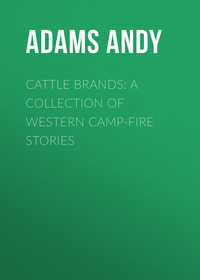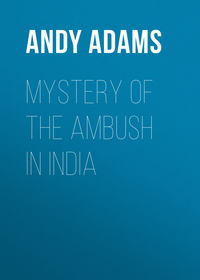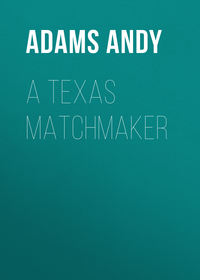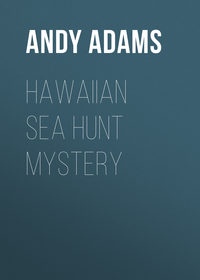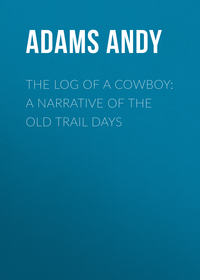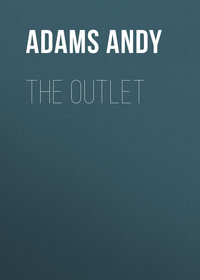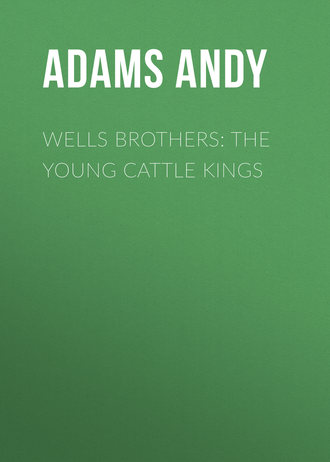 полная версия
полная версияWells Brothers: The Young Cattle Kings
"Mother used to read that to us," frankly admitted Dell. There was a marked silence, only broken by a clatter of hoofs, and the trail boss cantered up to the tent.
"That wagon track," said he, dismounting, "is little more than a dim trail. Sorry I didn't think about it sooner, but we ought to have built a smudge fire where this road intersects the cattle trail. In case the doctor doesn't reach there by noon, I sent orders to fly a flag at the junction, and Joel to return home. But if the doctor doesn't reach there until after darkness, he'll never see the flag, and couldn't follow the trail if he did. We'll have to send Joel back."
"It's my turn," said Dell. "I know how to build a smudge fire; build it in a circle, out of cattle chips, in the middle of the road."
"You're a willing boy," said Priest, handing the bridle reins to Dell, "but we'll wait until Joel returns. You may water my horse and turn him in the corral."
The day wore on, and near the middle of the afternoon Joel came riding in. He had waited fully an hour after the departure of the herd, a flag had been left unfurled at the junction, and all other instructions delivered. Both Forrest and Priest knew the distance to the ford on the Republican, and could figure to an hour, by different saddle gaits, the necessary time to cover the distance, even to Culbertson. Still there was a measure of uncertainty: the messenger might have lost his way; there might not have been any physician within call; accidents might have happened to horse or rider,–and one hour wore away, followed by another.
Against his will, Dell was held under restraint until six o'clock. "It's my intention to follow him within an hour," said the foreman, as the boy rounded a bluff and disappeared. "He can build the fire as well as any one, and we'll return before midnight. That'll give the doctor the last minute and the benefit of every doubt."
The foreman's mount stood saddled, and twilight had settled over the valley, when the occupants of the tent were startled by the neigh of a horse. "That's Rowdy," said Forrest; "he always nickers when he sights a wagon or camp. Dell's come."
Joel sprang to the open front. "It's Dell, and there's a buckboard following," he whispered. A moment later the vehicle rattled up, led by the irrepressible Dell, as if in charge of a battery of artillery. "This is the place, Doctor," said he, as if dismissing a troop from cavalry drill.
The physician proved to be a typical frontier doctor. He had left Culbertson that morning, was delayed in securing a relay team at the ford on the Republican, and still had traveled ninety miles since sunrise. "If it wasn't for six-shooters in this country," said he, as he entered the tent, "we doctors would have little to do. Your men with the herd told me how the accident happened." Then to Forrest, "Son, think it'll ever happen again?"
"Yes, unless you can cure a fool from lending his pistol," replied Forrest.
"Certainly. I've noticed that similarity in all gunshot wounds: they usually offer good excuses. It's healing in its nature," commented the doctor, as he began removing the bandages. As the examination proceeded, there was a running comment maintained, bordering on the humorous.
"If there's no extra charge," said Forrest, "I wish you would allow the boys to see the wounds. You might also deliver a short lecture on the danger of carrying the hammer of a pistol on a loaded cartridge. The boys are young and may take the lesson seriously, but you're wasting good breath on me. Call the boys–I'm an old dog."
"Gunshot wounds are the only crop in this country," continued the doctor, ignoring the request, "not affected by the drouth. There's an occasional outbreak of Texas fever among cattle, but that's not in my department. Well, that bullet surely was hungry for muscle, but fortunately it had a distaste for bone. This is just a simple case of treatment and avoiding complications. Six weeks to two months and you can buckle on your six-shooter again. Hereafter, better wear it on the other side, and if another accident occurs, it'll give you a hitch in each leg and level you up."
"But there may be no fool loafing around to borrow it," protested Forrest.
"Never fear, son; the fool's eternal," replied the doctor, with a quiet wink at the others.
The presence and unconcern of the old physician dispelled all uneasiness, and the night passed without anxiety, save between the boys. Forrest's lecture to Dell during the day, of the importance of making friends with the drovers, the value of the water, the purchase of disabled cattle, was all carefully reviewed after the boys were snugly in bed. "Were you afraid of the men with the herd to-day?–afraid of the cowboys?" inquired Dell, when the former subject was exhausted.
"Why, no," replied Joel rather scornfully, from the security of his bunk; "who would be afraid? They are just like any other folks."
Dell was skeptical. "Not like the pictures of cowboys?–not shooting and galloping their horses?"
"Why, you silly boy," said Joel, with contempt; "there wasn't a shot fired, their horses were never out of a walk, never wet a hair, and they changed to fresh ones at noon. The only difference I could see, they wore their hats at dinner. And they were surely cowboys, because they had over three thousand big beeves, and had come all the way from Texas."
"I wish I could have gone," was Dell's only comment.
"Oh, it was a great sight," continued the privileged one. "The column of cattle was a mile long, the trail twice as wide as a city street, and the cattle seemed to walk in loose marching order, of their own accord. Not a man carried a whip; no one even shouted; no one as much as looked at the cattle; the men rode away off yonder. The herd seemed so easy to handle."
"And how many men did it take?" insisted Dell.
"Only eleven with the herd. And they had such queer names for their places. Those in the lead were point men, those in the middle were swing men, and the one who brought up the rear was the drag man. Then there was the cook, who drove the wagon, and the wrangler, who took care of the horses–over one hundred and forty head. They call the band of saddle horses the remuda; one of the men told me it was Spanish for relay–a relay of horses."
"I'm going the next time," said Dell. "Mr. Quince said he would buy us a cow from the next herd that passed."
"These were all big beeves to-day, going to some fort on the Yellowstone River. And they had such wide, sweeping horns! And the smartest cattle! An hour before noon one of the point men gave a shrill whistle, and the whole column of beeves turned aside and began feeding. The men called it 'throwing the herd off the trail to graze.' It was just like saying halt! to soldiers–like we saw at that reunion in Ohio."
"And you weren't afraid?" timidly queried the younger brother.
"No one else was afraid, and why should I be? I was on horseback. Stop asking foolish questions and go to sleep," concluded Joel, with pitying finality, and turned to the wall.
"But suppose those big Texas beeves had stampeded, then what?" There was challenge in Dell's voice, but the brother vouchsafed no answer. A seniority of years had given one a twelve hours' insight over the other, in range cattle, and there was no common ground between sleepy bedfellows to justify further converse. "I piloted in the doctor, anyhow," said Dell defensively. No reply rewarded his assertion.
Morning brought little or no change in the condition of the wounds. The doctor was anxious to return, but Priest urged otherwise. "Let's call it Sunday," said he, "and not work to-day. Besides, if I overtake the herd, I'll have to make a hand. Wait until to-morrow, and we'll bear each other company. If another herd shows up on the trail to-day, it may have a cow. We must make these boys comfortable."
The doctor consented to stay over, and amused himself by quarreling with his patient. During the forenoon Priest and Joel rode out to the nearest high ground, from which a grove was seen on the upper Beaver. "That's what we call Hackberry Grove," said Joel, "and where we get our wood. The creek makes a big bend, and all the bottom land has grown up with timber, some as big as a man's body. It doesn't look very far away, but it takes all day to go and come, hauling wood. There's big springs just above, and the water never fails. That's what makes the trees so thrifty."
"Too bad your father didn't start a little ranch here," said Priest, surveying the scene. "It's a natural cattle range. There are the sand hills to the south; good winter shelter and a carpet of grass."
"We were too poor," frankly admitted the boy. "Every fall we had to go to the Solomon River to hunt work. With pa's pension, and what we could earn, we held down the homestead. Last fall we proved up; pa's service in the army counted on the residence required. It doesn't matter now if we do leave it. All Dell and I have to do is to keep the taxes paid."
"You would be doing wrong to leave this range," said the trail boss in fatherly tones. "There's a fortune in this grass, if you boys only had the cattle to eat it. Try and get a hundred cows on shares, or buy young steers on a credit."
"Why, we have no money, and no one would credit boys," ruefully replied Joel.
"You have something better than either credit or money," frankly replied the cowman; "you control this range. Make that the basis of your beginning. All these cattle that are coming over the trail are hunting a market or a new owner. Convince any man that you have the range, and the cattle will be forthcoming to occupy it."
"But we only hold a quarter-section of land," replied the boy in his bewilderment.
"Good. Take possession of the range, occupy it with cattle, and every one will respect your prior right," argued the practical man. "Range is being rapidly taken up in this western country. Here's your chance. Water and grass, world without end."
Joel was evidently embarrassed. Not that he questioned the older man's advice, but the means to the end seemed totally lacking. The grind of poverty had been his constant companion, until he scarcely looked forward to any reprieve, and the castles being built and the domain surveyed at the present moment were vague and misty. "I don't doubt your advice," admitted the boy. "A man could do it, you could, but Dell and I had better return to the settlements. Mr. Quince will surely be well by fall."
"Will you make me a promise?" frankly asked the cowman.
"I will," eagerly replied the boy.
"After I leave to-morrow morning, then, tell Forrest that you are thinking of claiming Beaver Creek as a cattle range. Ask him if he knows any way to secure a few cows and yearlings with which to stock it. In the mean time, think it over yourself. Will you do that?"
"Y-e-s, I–I will," admitted Joel, as if trapped into the promise.
"Of course you will. And ask him as if life and death depended on securing the cattle. Forrest has been a trail foreman and knows all the drovers and their men. He's liable to remain with you until the season ends. Now, don't fail to ask him."
"Oh, I'll ask him," said Joel more cheerfully. "Did you say that control of a range was a basis on which to start a ranch, and that it had a value?"
"That's it. Now you're catching the idea. Lay hold and never lose sight of the fact that a range that will graze five to ten thousand cattle, the year round, is as good as money in the bank."
Joel's faculties were grappling with the idea. The two turned their horses homeward, casting an occasional glance to the southward, but were unrewarded by the sight of a dust cloud, the signal of an approaching herd. The trail foreman was satisfied that he had instilled interest and inquiry into the boy's mind, which, if carefully nurtured, might result in independence. They had ridden several miles, discussing different matters, and when within sight of the homestead, Joel reined in his horse. "Would you mind repeating," said he, "what you said awhile ago, about control of a range by prior rights?"
The trail foreman freely responded to the awakened interest. "On the range," said he, "custom becomes law. No doubt but it dates back to the first flocks and herds. Its foundations rest on a sense of equity and justice which has always existed among pastoral people. In America it dates from the first invasion of the Spanish. Among us Texans, a man's range is respected equally with his home. By merely laying claim to the grazing privileges of public domain, and occupying it with flocks or herds, the consent of custom gives a man possession. It is an asset that is bought and sold, and is only lost when abandoned. In all human migrations, this custom has followed flocks and herds. Title to land is the only condition to which the custom yields."
"And we could claim this valley, by simply occupying it with cattle, and hold possession of its grazing privileges?" repeated the boy.
"By virtue of a custom, older than any law, you surely can. It's primal range to-day. This is your epoch. The buffalo preceded you, the settler, seeking a home, will follow you. The opportunity is yours. Go in and win."
"But how can we get a start of cattle?" pondered Joel.
"Well, after I leave, you're going to ask Forrest that question. That old boy knows all the ins and outs, and he may surprise you. There's an old maxim about where there's a will there's a way. Now if you have the will, I've a strong suspicion that your Mr. Quince will find the way. Try him, anyhow."
"Oh, I will," assured Joel; "the first thing in the morning."
The leaven of interest had found lodgment. A pleasant evening was spent in the tent. Before excusing the lads for the night, Priest said to the doctor: "This is a fine cattle range, and I'd like your opinion about these boys starting a little ranch on the Beaver."
"Well," said the old physician, looking from Joel to Dell, "there are too many lawyers and doctors already. The farmers raise nothing out here, and about the only prosperous people I meet are you cowmen. You ride good horses, have means to secure your needs, and your general health is actually discouraging to my profession. Yes, I think I'll have to approve of the suggestion. A life in the open, an evening by a camp-fire, a saddle for a pillow–well, I wish I had my life to live over. It wouldn't surprise me to hear of Wells Brothers making a big success as ranchmen. They have health and youth, and there's nothing like beginning at the bottom of the ladder. In fact, the proposition has my hearty approval. Fight it out, boys; start a ranch."
"Come on, Dell," said Joel, leading the way; "these gentlemen want to make an early start. You'll have to bring in the horses while I get breakfast. Come on."
CHAPTER III
THE BOTTOM RUNG
An early start was delayed. Joel had figured without his guest, as the Texan stands in a class by himself. The peace and serenity of pastoral life affects its people, influencing their normal natures into calm and tranquil ways. Hence, instead of the expected start at sunrise, after breakfast the trail foreman languidly sauntered out to the corral, followed by the boys.
The old physician, even, grew impatient. "What on earth do you think is detaining that man?" he inquired of Forrest. "Here the sun is nearly an hour high, and not a wheel turning. And I can see him from the tent opening, sitting on a log, flicking the ground with his quirt and chatting with those boys. What do you suppose they are talking about?"
"Well, now, that's a hard question," answered Forrest. "I'll chance the subject is of no importance. Just a little social powwow with the boys, most likely. Sit down, Doctor, and take life easy–the cows will calve in the spring."
Patience had almost ceased to be a virtue when the trail boss put in an appearance at the tent. "You are in no particular hurry, are you, Doctor?" he inquired, with a friendly smile.
"Oh, no," said the physician, with delightful irony; "I was just thinking of having the team unhooked, and lay over another day. Still, I am some little distance from home, and have a family that likes to see me occasionally."
The buckboard rattled away. "Come in the tent," called Forrest to the boys. "If old Paul sees you standing out there, he's liable to think of something and come back. Honestly, when it comes to killing time, that old boy is the bell steer."
Only three were now left at the homestead. The first concern was to intercept the next passing herd. Forrest had a wide acquaintance among trail foremen, had met many of them at Dodge only ten days before, while passing that supply point, and it was a matter of waiting until a herd should appear.
There was little delay. Joel was sent at ten o'clock to the nearest swell, and Dell an hour later. The magic was working overtime; the dust cloud was there! In his haste to deliver the message, the sentinel's horse tore past the tent and was only halted at the corral. "It's there!" he shouted, returning, peering through the tent-flaps. "They're coming; another herd's coming. It's in the dip behind the first divide. Shall I go? I saw it first."
"Dismount and rest your saddle," said Forrest. "Come in and let's make a little medicine. If this herd has one, here's where we get a cow. Come in and we'll plot against the Texans."
With great misgiving, Dell dismounted. As he entered the tent, Forrest continued: "Sit on the corner of my bunk, and we'll talk the situation over. Oh, I'm going to send you, never fear. Now, the trouble is, we don't know whose herd this may be, and you must play innocent and foxy. If the herd is behind the first divide, it'll water in the Beaver about four o'clock. Now, ride down the creek and keep your eagle eye open for a lone horseman, either at the crossing or on the trail. That's the foreman, and that's the man we want to see. He may be ten miles in the lead of his herd, and you want to ride straight to him. Give him all the information you can regarding the water, and inquire if this is one of Lovell's herds. That will put you on a chatting basis, and then lead up to your errand. Tell him that you are running a trail hospital, and that you have a wounded man named Quince Forrest at your camp, and ask the foreman to come up and see him. Once you get him here, your work is over, except going back after the cow."
Dell was impatient to be off, and started for the opening. "Hold on," commanded Forrest, "or I'll put a rope on you. Now, ride slowly, let your horse set his own pace, and don't come back without your man. Make out that I'm badly wounded, and that you feel uneasy that blood poisoning may set in."
The messenger lost no time in getting away. Once out of sight of the tent, Dell could not resist the temptation to gallop his mount over level places. Carrying the weight of a boy was nothing to the horse, and before half an hour had passed, the ford and trail came in view of the anxious courier. Halting in order to survey the horizon, the haze and heat-waves of summer so obstructed his view that every object looked blurred and indistinct. Even the dust cloud was missing; and pushing on a mile farther, he reined in again. Now and then in the upper sky, an intervening cloud threw a shadow over the plain, revealing objects more distinctly. For a moment one rested over the trail crossing, and like prophecy fulfilled, there was the lone horseman at the ford!
In the waste places it is a pleasure to unexpectedly meet a fellow being. Before being observed, Dell rode within hailing distance, greeting, and man and boy were soon in friendly converse. There was water sufficient for all needs, the herd required no pilot, the summons found a ready response, and the two were soon riding up the Beaver in a jog trot.
The gait admitted of free conversation, and the new foreman soon had Dell on the defensive. "I always hate to follow a Lovell outfit," said the stranger regretfully; "they're always in trouble. Old man Don's a nice enough man, but he sure works sorry outfits on the trail. I've been expecting to hear something like this. If it isn't rebranding their saddle stock with nigger brands, it's sure to be something worse. And now that flat-headed Quince Forrest plows a fire-guard down his own leg with a six-shooter! Well, wouldn't that sour sweet milk!"
"Oh, it wasn't his fault," protested Dell; "he only loaned his pistol, and it was returned with the hammer on a cartridge."
"Of course," disgustedly assented the trail boss; "with me it's an old story. Hadn't no more sabe than to lend his gun to some prowling tenderfoot. More than likely he urged its loan on this short-horn. Yes, I know Colonel Forrest; I've known him to bet his saddle and ride bareback as the result. It shows his cow-sense. Rather shallow-brained to be allowed so far from home."
"Well," contended poor Dell, "they surely were no friends. At least Mr. Quince don't speak very highly of that man."
"That's his hindsight," said the trail foreman. "If the truth ever comes out, you'll notice his foresight was different. Colonel Quince is famous, after the horse is stolen, for locking the stable door. That other time he offered to take an oath, on a stack of Bibles, never to bet his saddle again. The trouble is the game never repeats; the play never comes up twice alike. If that old boy's gray matter ever comes to full bloom, long before his allotted time, he'll wither away."
Dell was discouraged. He realized that his defense of his friend was weak. This second foreman seemed so different from either Priest or Forrest. He spoke with such deep regret of the seeming faults of others that the boy never doubted his sincerity. He even questioned Dell with such an innocent countenance that the lad withered before his glance, and became disheartened at the success of the errand. Forced to the defense continually, on several occasions Dell nearly betrayed the object of bringing the new man to the homestead, but in each instance was saved by some fortunate turn in the conversation. Never was sight more welcome than the tent, glistening in the sun, and never was relief from duty more welcome to a courier. The only crumb of comfort left to the boy who had ridden forth so boldly was that he had not betrayed the object of his mission and had brought the range men together. Otherwise his banner was trailing in the dust.
The two rode direct to the tent. During the middle of the day, in order to provide free ventilation, the walls were tucked up, and the flaps, rear and front, thrown wide open. Stretched on his bunk, Forrest watched the opening, and when darkened by the new arrival, the wounded man's greeting was most cordial. "Well, if it isn't old Nat Straw," said he, extending his hand. "Here, I've been running over in my mind the different trail bosses who generally go north of the Platte River, but you escaped my memory. It must have gotten into my mind, somehow, that you had married and gone back to chopping cotton. Still driving for Uncle Jess Ellison, I reckon?"
"Yes, still clerking for the same drover," admitted Straw, glancing at the wounded limb. "What's this I hear about you laying off, and trying to eat some poor nester out of house and home? You must be getting doty."
"Enjoy yourself, Nat. The laugh's on me. I'm getting discouraged that I'll ever have common horse sense. Isn't it a shame to be a fool all your life!"
Straw glanced from the bunk to Dell. "I was just telling the boy, as we rode up the creek, that you needed a whole heap of fixing in your upper loft. The poor boy tried his best to defend you, but it was easy to see that he hadn't known you long."
"And of course you strung him for all he could carry," said Forrest. "Here, Dell. You were in such a hurry to get away that I overlooked warning you against these trail varmints. Right now, I can see old Nat leading you in under a wet blanket, and your colors dragging. Don't believe a word he told you, and don't even give him a pleasant look while he stays here."
The discouraged boy brightened, and Joel and Dell were excused, to water and picket the horses. "You ought to be ashamed of yourself," resumed Forrest, "brow-beating that boy. Considering my hard luck, I've fallen into angels' hands. These boys are darling fellows. Now before you leave, square yourself with that youngest one."
"A little jollying while he's young won't hurt him," replied Straw. "It's not a bad idea to learn early to believe nothing that you hear and only half of what you see. If you had been taken snipe hunting oftener when you were young, it wouldn't hurt you any now. There are just about so many knocks coming to each of us, and we've got to take them along with the croup, chicken-pox, measles, and mumps."


